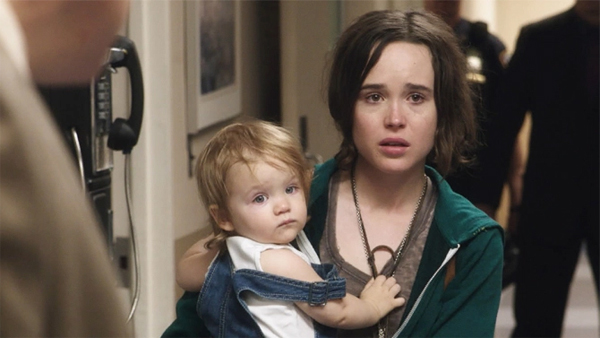Tallulah Review
As I was watching Sian Heder’s Tallulah, I couldn’t shake the implausibility of the premise. A young nomadic woman steals the baby of a rich, careless mother? The film offers a title character who is easy to accept as impulsive and destructive, but a kidnapper? Please.
Then something funny happened. I started to empathize with the title character. The film sheds a light on why she’s making such bad choices, and I found myself wanting her to emerge from her predicament unscathed. Still, the film goes out of its way to humanize the victim of her crime, and I reached the film’s climax with a knot the size of my fist in my stomach. This scenario is designed for an emotional crash, and you just don’t want it to come because everyone involved deserves better. That’s good characterization. That’s good storytelling.
This is a damn good movie.
Ellen Page plays Tallulah, who lives out of her van with her boyfriend, Nico (Evan Jonigkeit). One evening, they argue a bit about what their next move is; He wants to see his mom, Margo (Allison Janney), and find a home base, while she reminds him that’s not what he signed up for with her. In the morning, Tallulah wakes up, and Nico is gone.
She drives to New York, thinking he might be at his mother’s apartment. After being immediately rebuffed by Margo, fate brings her into the acquaintance of Carolyn (Tammy Blanchard), a very wealthy woman who appears to have no interest in her infant daughter, Madison. She pays Tallulah a ton of money to watch Madison for the night while she goes out and gets plastered. Tallulah, seeing a very negative situation for this little girl, decides the next day to take her with her to Margo’s house and pass Madison off as her and Nico’s child.
The film also revels in a sort of emotional claustrophobia, something I alluded to earlier, wherein these women have entire cities to play in, yet as the film progresses, it seems their entire lives are collapsing in on themselves. For Tallulah, it’s a series of lies that couldn’t possibly sustain themselves, and while they were made out or short-term necessity to a certain extent, something real and meaningful ultimately emerged, and her panic is over losing that meaning.
Carolyn, of course, has lost a child — the most horrific scenario of these three by far — and it has awoken something in her she didn’t know was there. At the same time, she’s actually chasing her daughter blindly around the city. In one instance, she somehow gets close, and her helplessness is palpable and heartbreaking.
Margo, meanwhile, undergoes a change as she tries to let go of her ex-husband. It’s been years since he left her for a man, but she refuses to sign the formal divorce papers. This eventually overwhelms her, and like everything else in Tallulah, it comes to a head in a scene that could have been silly and forced, but thanks to smart writing and a beautiful performance from Janney, it’s a knockout.
Blanchard isn’t as well known as Janney, but she’s been excellent before and I’m sure will be excellent again. Page, on the other hand, is something of a revelation. Of course, she’s got an Oscar nomination under her belt, but Juno (both the character and the film) is a fiasco. It wasn’t until this film that I bought into her as an exceptional actress. Some of the Ellen Page stereotypes are on full display in the film’s opening few scenes — snark, faux-aloofness — but it melts away as Tallulah progresses. By the film’s close, I fell for this character and Page’s performance hook, line, and sinker.
Heder’s direction, too, is something that won’t reveal itself as brilliant as you’re watching Tallulah, but the way the story is told — the decisions regarding what to show us and when — demonstrates skill far beyond one’s first feature film. I very much look forward to what this talented woman has up her sleeve next. Until then, we have Tallulah — a gem that Netflix probably doesn’t yet know what to do with. A film about impulses and consequences both large and small, it ranks among this (rapidly improving) year’s best efforts.
















